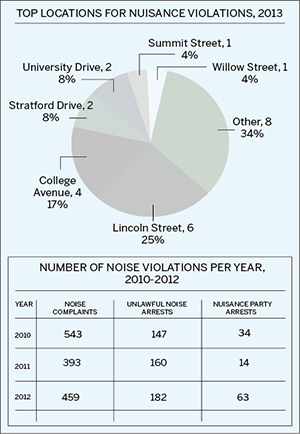Too loud and you’ll pay

Information from the Kent Police Department. Graphic by Rachel Mullenax.
October 22, 2013
In the first two months of the school year, the Kent Police Department has issued four bills to properties for a total of $200 — a drop from last fall, when one property alone collected more than $900 in fines and was labeled a nuisance property by the police department.
The Criminal Activity Nuisance Ordinance, passed by city council in 2004, states that Kent properties that receive two nuisance violations within six months are labeled nuisance properties. If the same property receives another nuisance violation within the next six months, its owner will receive a bill for the time officers have spent on that property.
“If you look at our statistics, we have more (partying) because we are a college town,” Kent Police Lt. James Prusha said.
A University Drive property was billed three times for incidents such as littering, nuisance parties, unlawful noise and disorderly conduct. One-third of all bills issued by the police department last year totaled more than $300.
Prusha said situations and factors leading to these bills, which often can escalate, are taken seriously by the police department. In 2012, the number of nuisance party arrests spiked to 63 from 14 the year before. The number of unlawful-noise arrests rose more than 13 percent during the same time frame.
“We’ll be proactive,” Prusha said. “If we’re walking down the street and we see that there are 400 people out on the front lawn drinking beer, we’ll go there right then before it gets into something worse.”
The ordinance outlines that the cost of each bill is based upon the hourly wages of the city of Kent employees who responded to the incident — plus 75 percent of that cost. This number is multiplied by the amount of time employees spent at the property. These employees could include police officers, health officials or fire fighters. For large events that require a big response, costs can add up.
In one case last year, nine police officers responded and the bill reached almost $500.
Another contributing factor to the bill’s cost is the minimum amount of time for which a property owner can be billed is one hour.
“Even if we were there for 20 minutes, we still count it as an hour,” Prusha said.
Although the reason for the ordinance is to create less nuisances for residents of the city, its effectiveness is undetermined.
“I hope (it’s working),” Prusha said. “Landlords tend to be responsive once it starts hitting their wallets.”
Most of the time, however, it’s not the landlords paying, it’s the students living in the property.
“We hold the landlords responsible, but many times the landlords will then hold the tenants responsible,” Prusha said.
Lisa Hale-Meindl, senior regional director of EdR, which owns The Province, explains that if a fine is received from the police department, the cost will be passed on to the residents responsible for that fine. At the second offense, the residents’ lease might even be terminated, which is clearly presented in the Rules and Regulations section of a resident’s lease.
Meindl explains that the goal of this policy is to encourage peaceful neighbors who make a positive contribution to the neighborhood.
“If the police department issues fines or makes arrests in its effort to maintain a peaceful community, we will support their efforts,” Meindl said.
Prusha said this strategy should cause a lot of residents to think twice.
“Not only are they getting in trouble for the original reason we went there, but they’re also having their landlord call, threatening to evict them,” Prusha said.
The Province did not receive any fines because nuisance violations when it opened last year, nor has it received any this year. In contrast, more than half of nuisance violation bills were sent to properties located on University Drive last year. Other frequently billed areas include East College Avenue and Cherry Street.
In the past two years, the Kent Police Department responded to 29 incidents of unlawful noise, making it the most common incident leading to fines.
Elizabeth Blosfield is a city reporter for the Daily Kent Stater. Contact her at [email protected].
























